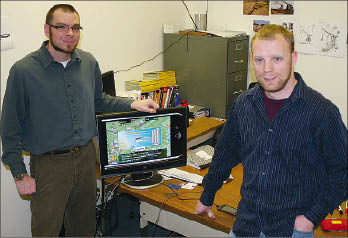
Home » Wading into the mobile 'app' market
Wading into the mobile 'app' market
Gourami Group now has four games in Apple store, including one for Telect

April 22, 2010
A tiny software development company here has been scratching its way into the crowded iPhone and iPod "apps" fray, with four games now, including a promotional game it developed for Liberty Lake-based Telect Inc., while it also builds a reputation for contract programming work.
The company, Gourami Group Inc., was launched in early 2009 by Gonzaga University graduate Erik Hutchinson and longtime programming partner Jason Lust, and earlier this year hired two additional employees, giving it four, including the two owners. It moved three months ago into space in the Vista Industrial Park, at 111 N. Vista, in Spokane Valley, where it hopes to expand by two to three more employees by the end of the year.
Much of Gourami Group's work amounts to contract programming, in which it takes on small software development projects for hire, but it also has created four games for mobile devices, all marketed through Apple Inc.'s App Store.
The most recent of those games is called Telecom Tycoon, which it did under contract for Telect and is intended to be a "fun way to promote" the telecommunications gear that Telect manufactures, says Hutchinson, Gourami's president.
In the game, which iPhone and iPod users can download for free, users act like the heads of wireless telecommunications companies and try to build the right cell towers in the right locations to attract subscribers and get a return on their investment. The game includes cartoon depictions of real cities, including Spokane, and is in the vein of other business simulation games, including Sid Meier's Railroad Tycoon.
While playing the game, users see small boxes pop up to promote Telect products. The products likely are recognizable only to people familiar with the telecom industry, and include such devices as load-center frames for core routers, Ethernet patch bays, and gear it calls the "new standard for DSX-3 circuit density."
"We're excited to launch Telecom Tycoon. It's a fun way to utilize the wireless networks that incorporate our equipment as core infrastructure," said Telect CEO Wayne Williams, in a press release introducing the game last month.
Hutchinson says Gourami won the project after Telect invited several local software developers to talk about Telect's vision for the application, and it took Gourami about two months to create the game and get it approved for sale in the App Store. He declines to discuss the value of the contract with Telect, but says its work with Telect will be ongoing. Gourami currently is modifying the game's code so it can be played on the new iPad device that Apple recently released, as well as on Android-type phones, and might add more enhancements to the game later.
Hutchinson and Lust both have prior experience in developing video games. They met while working for an animation company in Seattle, and both also worked for a third-party game developer in California. They say they have been involved in games created for Nintendo, including one adapted from the Powerpuff Girls television cartoon.
Lust, who is the company's director of design, says his specialty is in creating what's called Flash animation. Hutchinson's expertise is more in the C programming language and artificial intelligence, and he has worked for Next IT Corp. here, as well as Neokinetics Corp., of Coeur d'Alene.
Gourami Group is named after the Asian family of fish species called gourami, which are known for their ability to breath air through their mouths. "It's kind of the fish out of water thing," Hutchinson quips.
So far, the company has existed on a shoestring basis. Its quarters are modest. It buys its office electronics mostly at surplus-equipment sales at Community Colleges of Spokane. Its marketing is done almost entirely by word-of-mouth, based on the reputation Hutchinson and Lust earned partly while working in prior jobs.
"We get calls from people who say, 'Hey, remember when you did that thing for us? Well, we have more work you might be interested in,'" says Lust.
The work Gourami does under contract is varied, but has ranged from helping companies get their databases onto mobile devices to doing Flash animations for the Nickelodeon TV network's Web site. It's currently negotiating possible work with an online dating service, Hutchinson says. He declines to disclose the company's revenues, but says its projects generally take two to three months to complete and that it charges its clients anywhere from a few thousand dollars to tens of thousands of dollars for a project.
In addition to Hutchinson and Lust, Gourami employs a digital artist and a staffer who does a collection of tasks. It also contracts with someone who creates music for its games.
The company began creating games for iPhones and iPods late last winter, when contract work was slim.
"We had some slack time and we set out to develop some games, to do our own IP (intellectual property)," Hutchinson says. He says they chose that platform partly because "we're essentially a Mac shop," and because the barrier to entry in that market is small compared with doing games for videogame players made by such giants as Nintendo, Sony, and Microsoft.
It costs about $100 for a development kit to make Apple mobile apps and it doesn't cost anything to get the app included in the App Store, as long as someone at Apple "sees value in your game," Hutchinson says. Once a game is approved, Apple keeps one-third of the revenue from every sale, he says.
Gourami's first game, called iBrawl, was introduced in March. "It's totally different," says Hutchinson. Essentially, the players combat one another by shaking and twisting their iPhone or iPod violently. The game records the actions, and a remote server compares them with those of the user's opponent to see who won the battle. Players can be challenged and notified of their outcome via e-mail or texting. The game sells for 99 cents.
The second game was launched in July and is more of a classic arcade game, called HungryGators, in which players try to keep visiting alligators happy and well fed. It also is priced at 99 cents. The third game, called Kachina, is a tactical tile game based on Hopi tribe traditions. It came out in August and sells for $2.99.
So far, sales have been relatively modest. Including the free Telecom Tycoon game, Gourami Games, which is Gourami Group's games division, has had roughly 20,000 downloads through the App Store, Hutchinson says.
He says the approval process at Apple can take just a couple of weeks to navigate, but also can be frustrating. On its iBrawl game, Gourami had to change "really cool" artwork because the device gripped by the fist in the game looked too much like an iPhone, and Apple didn't like that, even though another maker's game was approved later with similar art, he says.
"It's a mystery process," he says, adding that it depends on who at Apple is assigned to handle the approval.
Though the prices of such games are low, the object for some designers is to get their names out there and attract attention in the industry. In the case of the Telecom Tycoon, Telect is promoting the game on its own, which has helped. The promotional game attracted about 6,500 downloads in its first couple of weeks, Hutchinson says.
He says that game helped the company pull through a tough 2009, but 2010 is "starting out really good." He says that if some programming contracts come through that Gourami is hoping to land, it should be able to expand its staff this year.
Meanwhile, the company also has plans to launch a fifth game, though Hutchinson declines to elaborate on those plans.
"It's very important for us to have our own IP," as opposed to just doing contract work, he says
As for the future, Hutchinson and Lust say they hope to see Gourami grow to perhaps 30 to 50 employees and to have "multiple contracts" going on at any given time.
Although it's willing to take on most any kind of programming with which it has expertise, Gourami likely will remain focused on applications and games for mobile computing, he says.
"That's our strong point," says Hutchinson.
Latest News
Related Articles





